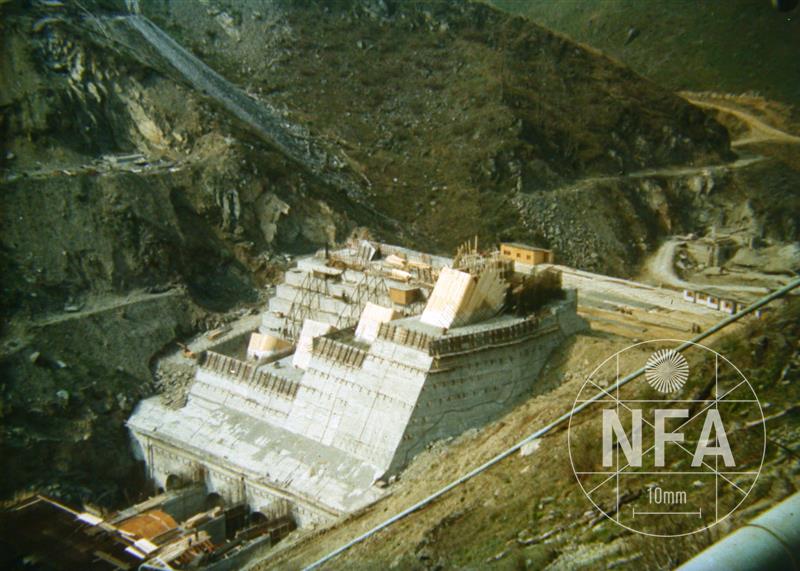Who Looks for Gold
Country
CzechoslovakiaCopyright
1974Production year
1974Premiere
20 December 1974Runtime
93 minDirector
Jiří MenzelCategory
filmGenre
psychologicalTypology
featuretheatrical distributionlongOriginal title
Kdo hledá zlaté dnoCzech title
Kdo hledá zlaté dnoEnglish title
Who Looks for GoldWorking title
Frajeři na blátěSummary
For many directors of the day, the transition from the 1960s Czechoslovak New Wave to the 1970s “normalisation” era was a very painful one. Director Jiří Menzel may have had an Oscar under his belt for the celebrated Ostře sledované vlaky (Closely Watched Trains, 1966), but his adaptation of Bohumil Hrabal's novel Skřivánci na niti (Skylarks on the String) found itself locked away in a vault by the authorities until after the Velvet Revolution (though produced in 1969 it was only released as late as 1990). Although Menzel was at the peak of his directorial powers, the experience meant he did not return to film directing until 1974 with this doctrinarian “building a better future” film about a young clockmaker (Jan Hrušínský), who after leaving the army only finds his true fulfilment while working on the construction of an electricity plant in Dalešice. Among these “right-minded” workers, the man discovers the real meaning of life and finds the strength to split up from his bourgeoisie-minded girlfriend. Despite lacking Menzel’s personal stamps of playfulness and poeticism, the film can be described as a solid piece of work. Zdeněk Svěrák serves as co-writer alongside Menzel – the pair would cooperate heavily on projects over the ensuing decades.
Synopsis
Láďa Kratochvíl has completed his military service and returns back home to carry on his profession of a watchmaker, looking forward to see his girlfriend - a hairdresser Petra. He plans to propose her a marriage, but they do not have a place to live together, and moreover, his job is not very well paid. That is why he is leaving to Moravia to get a job at a huge construction of a Dalešice dam. He is offered a job as a lorry driver. Láďa is happy about the work, as well as about the wages, but he is missing Petra a lot. His nostalgia will be cured by girlfriend Petra's visite. She comes to see him on Fridays, trying to persuade him to come back to Prague with her. Due to Petra, Láďa neglects his working duties and is transferred to a less attractive job. He tries hard to retrieve the lost credit, helping his co-worker Miky at a complicated repair of a new caterpillar. Doing so, Láďa has lost a lot of spare time, and Miky takes him to Prague to see Petra. Láďa is badly surprised seeing her locked with another man. The love has ended up for him. Láďa doesn't allow to be persuaded into returning to Petra but decides to come back to the construction site. He makes his money by doing a fair job on a new modern excavator entrusted to him by his fellow workers.
Cast
Jan Hrušínský
hodinář Láďa Kratochvíl, později řidič
Jana Giergielová
Voice by Jitka Zelenohorská
kadeřnice Petra
Július Pántik
řidič Miky Polievka
Alois Liškutín
vedoucí autoprovozu Dalibor
František Husák
Pepík Němec
Míla Myslíková
kantýnská Marcela
František Řehák
Petřin otec
Blažena Holišová
Petřina matka
Vlasta Jelínková
babička
Blanka Lormanová
Láďova sestra
Oldřich Vlach
Jirka, Láďův švagr
Otakar Dadák
řidič Jan Vízner, Marcelin muž
Jiří Jurka
řidič Slávek
Leopold Franc
řidič Provazník
Svatopluk Skopal
řidič Král
Oldřich Slavík
stavebník Nováček
Jan Heger-Kučera
Ferda
Jaroslav Rava
řidič Lojza
Karel Bělohradský
řidič Vyskočil
Jiří Koukola
řidič
Alexej Okuněv
zelinář Ivan
Ferdinand Krůta
hodinářský mistr
Jan Řeřicha
nešikovný hodinář později pumpař
Eugen Jegorov
hluchoněmý hodinář
Miroslav Masopust
taxikář Béďa Hustoles
Miloslav Štibich
Hořínek, soused ve vile
Alois Vachek
zákazník zelinářství
Karel Hovorka
řidič Julinek
Mária Nováková
kadeřnice
Taťána Radechovská
zmrzlinářka
Jiří Prokel
redaktor
Dubbing
Josef Abrhám
hlas řidiče při nakládání
Crew and creators
Director
Second Unit Director
Assistant Director
Continuity
Screenstory
Screenplay
Shooting Script
Dramaturg
Director of Photography
Second Unit Photography
Camera Operator
Bohumír Schwarzer
Production Designer
Set Designer
Costumes
Make-Up Artist
Film Editor
Assistant Film Editor
Sound Designer
Special Effects
Production Manager
Unit Production Manager
Unit Production Manager
Marie Ryšlinková
Consultant
Ing. J. Žáček, Přemysl Háček, Vladimír Ludka, Jaroslav Rybníček, J. Cejnar
Cooperation
Jitka Radová (klapka), Jiří Kučera (fotograf), zaměstnanci Vodního díla Dalešice
Music
Music Composed by
Music Performed by
FISYO (Music Conducted by František BelfínŠtěpán Koníček)
Songs
Na naší půdě
Song Composer Angelo Michajlov
Writer of Lyrics Zdeněk Svěrák
Singer Zdena Adamová
Mám ráda žužu
Song Composer Bohuslav Ondráček
Writer of Lyrics Zdeněk Borovec
Singer Naďa Urbánková
Cikánka
Song Composer Karel Vacek
Vklouzlo do nás kouzlo
Song Composer Angelo Michajlov
Writer of Lyrics Jiří Štaidl
Singer Jitka Molavcová
Kamarád
Song Composer Bill Monroe
Writer of Lyrics Marko Čermák
Singer Tomáš Linka
Production info
Original Title
Kdo hledá zlaté dno
Czech Title
Kdo hledá zlaté dno
English Title
Who Looks for Gold
Working Title
Frajeři na blátě
Category
film
Typology
featuretheatrical distribution
Genre
psychological
Origin country
Czechoslovakia
Copyright
1974
Production Year
1974
Production specifications
literary Screenplay approved 17 September 1973
start of filming 2 January 1974
technical Screenplay approved 18 February 1974
end of filming 16 July 1974
projection approval 23 July 1974
withdrawal from distribution 31 December 1989
Premiere
premiere 20 December 1974 /inaccessible for youths/ (celostátní)
premiere 9 January 1975 /inaccessible for youths/ (kino Sevastopol, Praha)
Production
Copyright Holders
Studio
Distribution
Creative Group
Dramaturgická skupina Miloše Brože, Miloš Brož (vedoucí dramaturgické skupiny)
Technical info
Duration typology
feature film
Duration in minutes
93 min
Original length in metres
2 615 meters
Distribution carrier
16mm, 35mm
Aspect ratio
1:1,66
Colour
colour
Sound
sound
Sound system/format
mono
Versions
Czech
Dialogue languages
Czech, Slovak
Subtitles languages
without subtitles
Opening/End credits languages
Czech
Awards
Vítěz
Festival: 13. filmový festival mladých Trutnov
1975
Trutnov / Czechoslovakia
Július Pántik
Vítěz
Festival: 13. festival českých a slovenských filmů Praha
1975
Praha / Czechoslovakia
Jaromír Šofr




